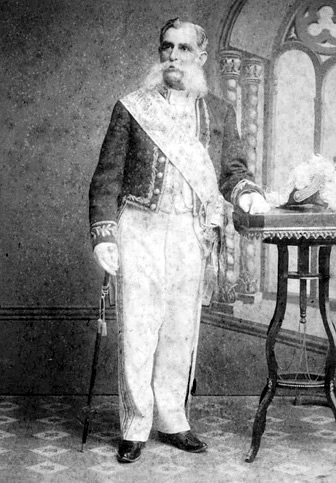Luis Benjamín Cordero Crespo (Cañar, April 6, 1833 – Cuenca, January 30, 1912) served as the 14th president of Ecuador between July 1, 1892 to April 16, 1895. Cordero began publishing poetry in Spanish and Quechua after his political and legal career, and in 1892 published the first Quicha-Spanish dictionary. In 1904 he wrote the Hymn of Azuay (also referred to as the Hymn of Cuenca) which is still in use today.
Hymn of Azuay
This song (with lyrics by Luis Cordero Crespo and music by Luis Pauta Rodríguez) was composed for the opening of the first Azuay exhibition on April 12, 1904, commemorating the 347th anniversary of the Spanish establishment of Cuenca. On April 19, 1945, 35 years after its composition, the Cantonal Council, led by Carlos Aguilar Vázquez, recognized it as the official Anthem through a municipal accord. Nonetheless, the Anthem was already being used prior to its formal approval. The municipal accord explains “that it is necessary to give official character to what the town has already sanctioned for use.”
According to the municipal agreement, its use is mandatory “in official acts in Cuenca.”
Himno de Azuay (o Himno a Cuenca)
CORO
¡Reina hermosa de fuentes y flores,
Cuenca ilustre de galas vestida,
rebosante de luz y de vida
lujo y honra del noble Ecuador!.
ESTROFAS
I
Tuyo el bravo La Mar de Ayacucho,
tuyo el Niño en Pichincha inmolado,
cuyo nombre Bolívar, pasmado,
de Colombia en el pecho grabó.
II
Los insignes Solanos, los Cuevas,
Malos, Vásquez, Arízagas, Vélez,
áureas plumas, helenos cinceles,
tuyos, Cuenca, tus próceres son.
III
De su gloria tu gloria dimana,
digna madre de egregios campeones,
y de sabios y santos varones,
luminares del patrio esplendor.
IV
Ten por lema virtud y trabajo;
con el sabio el obrero compita;
todo azuayo a sus hijos repita:
Sin trabajo y virtud, no hay honor.
V
Ten la fe por imán que te guíe
la esperanza por ancla segura:
mira al cielo y trabaja y procura
que la dicha te venga de Dios.
Works
- Una excursión a Gualaquiza (1875)
- Dos cantos a la raza latina (1883).
- El rimini llacta y el cuchiquillca (1884).
- El adiós (1891).
- Diccionario quichua-español, español-quichua (1892), awarded the Gran Medalla de Oro at the International Exposition of Madrid en 1892.
- Poesías serias (1895).
- Poesías jocosas (1895).
- A mis conciudadanos. Explicación circunstanciada de lo ocurrido en el odioso asunto del crucero de guerra Esmeralda (1896).
- Josefina Espinosa de Cordero: Libro de sus huérfanos (1900).
- La plenipotencia especial del Ecuador en el Primer Centenario de la Independencia de Chile (1911).

